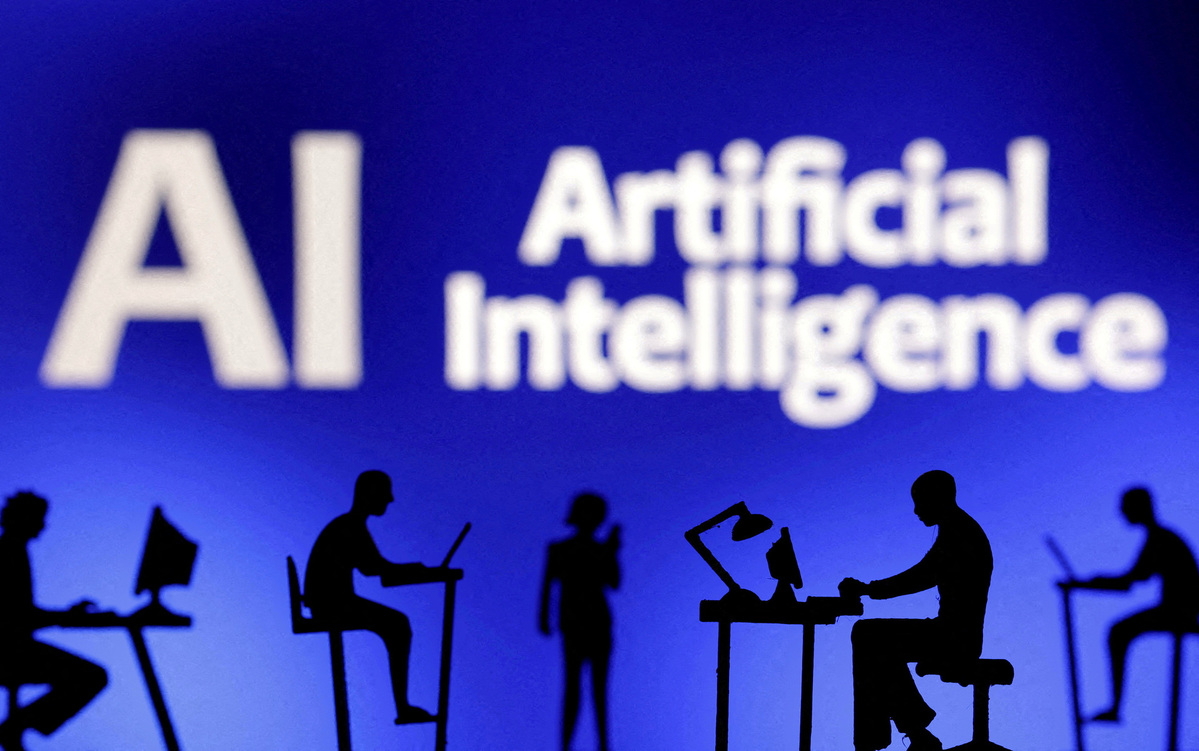AI reshaping global future in a new year


With the unprecedented advancement of technology, artificial intelligence is rapidly transforming societies and elevating global collaboration to new heights. AI has already made groundbreaking strides in the core areas of data, computing power and algorithms, ushering in a new era in which innovation is fueling large-scale applications. Given these developments, there is a need for the world to engage in dialogue and cooperation, in order to chart new pathways for the development of AI and build a brighter future.
The rapid progress of AI is based on a solid foundation. Data, computing power and algorithms, often referred to as the "three driving forces" of AI's development, are interdependent and mutually reinforcing. These are continuously pushing the boundaries of innovation, transitioning AI from an abstract concept to tangible applications. Underpinning this development are the foundational contributions of numerous scientists.
Data serve as the cornerstone of AI development. Global data generation continues to soar, providing an unprecedented wealth of resources for training and the optimization of AI models. Open-source data platforms have fueled the development of general-purpose models, while global internet users and industrial data offer highly customized training resources for industry-specific models, and high-quality data inputs facilitate the development of AI models.
For instance, Turing Award winner Judea Pearl's Bayesian networks have significantly improved the efficiency and reasoning capabilities of data analysis, while the spatial navigation mechanisms developed by Nobel Prize winner for Physiology/Medicine John O'Keefe and his team have developed AI to structure complex data environments. Yet data monopolization and scarcity have become critical bottlenecks, especially in vertical industries, which need to be addressed.
Algorithms are the driving force of AI systems. And AI's advancement in algorithms follows two primary directions: general-purpose large models and industry-specific large models. While general-purpose large models, such as OpenAI's ChatGPT and DeepMind's Gemini, excel in multimodal and multilingual processing, accelerating the adoption of generative AI, industry-specific large models such as AlphaFold have revolutionized biology by predicting protein structures.
Also, foundational contributions, such as Fields Medal winner Stephen Smale's work on saddle points in optimization theory, and Nobel Prize winner for Physics and the Turing Award winner Geoffrey Hinton's deep learning frameworks, have provided crucial mathematical and algorithmic underpinnings for AI models.
Besides, Nobel Prize winners for Chemistry Demis Hassabis and John Jumper have demonstrated the immense potential of domain-specific large models in addressing critical social issues. These pivotal efforts are driving the homomorphic and isomorphic development of problem spectrums, model groups and algorithm clusters within the technological paradigm, laying the foundation for the continuous innovation of AI.
Computing power serves as the energy source for AI's development. The demand for large-model computational capacity has surged, while technologies such as NVIDIA's GPUs and Google's TPUs have provided robust computational support for AI models.
More important, Google recently unveiled its Willow quantum chip, which performed a task, which would take a conventional supercomputer 10 septillion years, in five minutes — which is a giant leap forward in quantum technology.
On the other hand, China's "Eastern Data and Western Computing" initiative has helped expedite the construction of an integrated nationwide computing network, enabling efficient resource coordination. In this process, Fields Medal winner Terence Tao's contributions to harmonic analysis and partial differential equations have helped make AI computational models more precise and efficient. And Turing Award winners Allen Newell and Herbert Simon's research on the complexity and computational frameworks of algorithm has laid the groundwork for large-scale distributed computing.
Moreover, Nobel Prize winner for Physics Alain Aspect's experimental breakthroughs in quantum entanglement have further expanded the potential applications of quantum computing in enhancing AI's computational power. These breakthroughs, combined with traditional and quantum technologies, are paving the way for more efficient training and practical applications of AI models.
While it is crucial to achieve balanced and coordinated development, it is necessary to increase investments in data, algorithms and computing power, so as to synergize AI's core driving forces. The development of algorithms depends on high-quality data, but the scarcity of data and platforms has limited potential breakthroughs.
The widespread adoption of AI requires the participation of society as a whole. And more investments in education and skill training are needed to ensure ordinary people acquire AI-related skills.
While it is necessary to establish a platform for international dialogue and ethical standards, it is equally essential to develop a shared ethical framework to drive the development of AI, and ensure organizations such as the United Nations play the leading role in formulating and implementing rules for the use of AI especially in the fields of privacy protection, and algorithmic fairness and safety.
Since the development of AI requires collaboration among countries, the global leaders should build a global AI innovation network to advance AI technology. In this regard, China and the US, as the two leading major powers in global AI research and development, should seek common ground while respecting their differences, and boosting technology sharing and standard-setting. For example, the two countries could sign data-sharing agreements for AI model training and strengthen collaboration in AI applications in fields such as medicine and climate change.
Strengthening antitrust regulations is also necessary to prevent monopolization by a few companies, and ensure that AI technologies are accessible and beneficial to everyone.
AI represents a technological leap for humanity, but its progress should benefit all of humanity, not just a privileged few. So major AI powers must rise above their competition in high-tech and pursue win-win outcomes. By abandoning zero-sum games and embracing cooperation to achieve mutual benefit, countries around the world can embark on a global "AI labor race", turning AI into a powerful force for building a community with a shared future for mankind.
The author is a distinguished professor at Sichuan University, and a member of the National Committee of the Chinese People's Political Consultative Conference. The views don't necessarily reflect those of China Daily.
If you have a specific expertise, or would like to share your thought about our stories, then send us your writings at opinion@chinadaily.com.cn, and comment@chinadaily.com.cn.


































